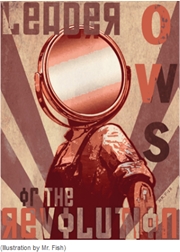“Why men do not revolt”
by Chris Hedges
(excerpted from Common Dreams column 5/14/12)
 In Robert E. Gamer’s book The Developing Nations is a chapter called “Why Men Do Not Revolt.” In it Gamer notes that although the oppressed often do revolt, the object of their hostility is misplaced. They vent their fury on a political puppet, someone who masks colonial power, a despised racial or ethnic group or an apostate within their own political class. The useless battles serve as an effective mask for what Gamer calls the “patron-client” networks that are responsible for the continuity of colonial oppression.
In Robert E. Gamer’s book The Developing Nations is a chapter called “Why Men Do Not Revolt.” In it Gamer notes that although the oppressed often do revolt, the object of their hostility is misplaced. They vent their fury on a political puppet, someone who masks colonial power, a despised racial or ethnic group or an apostate within their own political class. The useless battles serve as an effective mask for what Gamer calls the “patron-client” networks that are responsible for the continuity of colonial oppression.
The squabbles among the oppressed, the political campaigns between candidates who each are servants of colonial power, Gamer writes, absolve the actual centers of power from addressing the conditions that cause the frustrations of the people. Inequities, political disenfranchisement and injustices are never seriously addressed. “The government merely does the minimum necessary to prevent those few who are prone toward political action from organizing into politically effective groups,” he writes.
Gamer and many others who study the nature of colonial rule offer the best insights into the functioning of our corporate state. We have been, like nations on the periphery of empire, colonized. We are controlled by tiny corporate entities that have no loyalty to the nation and indeed in the language of traditional patriotism are traitors. They strip us of our resources, keep us politically passive and enrich themselves at our expense. The mechanisms of control are familiar to those whom the Martinique-born French psychiatrist and writer Frantz Fanon called “the wretched of the earth,” including African-Americans.
The colonized are denied job security. Incomes are reduced to subsistence level. The poor are plunged into desperation. Mass movements, such as labor unions, are dismantled. The school system is degraded so only the elites have access to a superior education. Laws are written to legalize corporate plunder and abuse, as well as criminalize dissent. And the ensuing fear and instability—keenly felt this past weekend by the more than 200,000 Americans who lost their unemployment benefits—ensure political passivity by diverting all personal energy toward survival. It is an old, old game.
A change of power does not require the election of a Mitt Romney or a Barack Obama or a Democratic majority in Congress, or an attempt to reform the system or electing progressive candidates, but rather a destruction of corporate domination of the political process—Gamer’s “patron-client” networks. It requires the establishment of new mechanisms of governance to distribute wealth and protect resources, to curtail corporate power, to cope with the destruction of the ecosystem and to foster the common good. But we must first recognize ourselves as colonial subjects. We must accept that we have no effective voice in the way we are governed. We must accept the hollowness of electoral politics, the futility of our political theater, and we must destroy the corporate structure itself.
The danger the corporate state faces does not come from the poor. The poor, those Karl Marx dismissed as the Lumpenproletariat, do not mount revolutions, although they join them and often become cannon fodder. The real danger to the elite comes from déclassé intellectuals, those educated middle-class men and women who are barred by a calcified system from advancement. Artists without studios or theaters, teachers without classrooms, lawyers without clients, doctors without patients and journalists without newspapers descend economically. They become, as they mingle with the underclass, a bridge between the worlds of the elite and the oppressed. And they are the dynamite that triggers revolt.
This is why the Occupy movement frightens the corporate elite…
Full column here, closes as follows:
The end of these regimes comes when old beliefs die and the organs of security, especially the police and military, abandon the elites and join the revolutionaries. This is true in every successful revolution. It does not matter how sophisticated the repressive apparatus. Once those who handle the tools of repression become demoralized, the security and surveillance state is impotent. Regimes, when they die, are like a great ocean liner sinking in minutes on the horizon. And no one, including the purported leaders of the opposition, can predict the moment of death. Revolutions have an innate, mysterious life force that defies comprehension. They are living entities.
…
A revolution has been unleashed across the globe. This revolution, a popular repudiation of the old order, is where we should direct all our energy and commitment. If we do not topple the corporate elites the ecosystem will be destroyed and massive numbers of human beings along with it. The struggle will be long. There will be times when it will seem we are going nowhere. Victory is not inevitable. But this is our best and only hope. The response of the corporate state will ultimately determine the parameters and composition of rebellion.
I pray we replicate the 1989 nonviolent revolutions that overthrew the communist regimes in Eastern Europe. But this is not in my hands or yours. Go ahead and vote this November. But don’t waste any more time or energy on the presidential election than it takes to get to your polling station and pull a lever for a third-party candidate—just enough to register your obstruction and defiance—and then get back out onto the street. That is where the question of real power is being decided.
This post has been read 1877 times!


